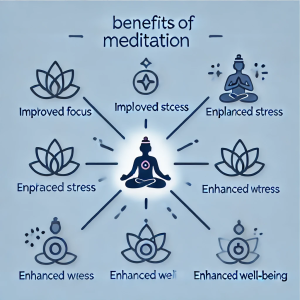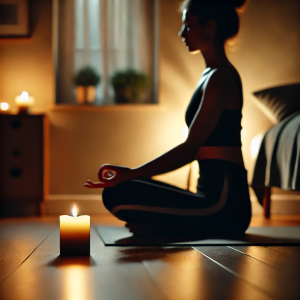By: Dr. Anjali Mehta, Kundalini Yoga Instructor and Holistic Sexuality Expert

Meditation is a powerful practice that has been used for thousands of years to cultivate inner peace, enhance self-awareness, and promote overall well-being. For beginners, the idea of sitting quietly and calming the mind can seem daunting. However, with the right guidance and a willingness to learn, anyone can develop a successful meditation practice. This comprehensive guide will walk you through the basics of meditation, offer tips for getting started, and provide practical techniques to help you on your journey.

Contents
Understanding Meditation
Meditation is a practice that involves focusing the mind and eliminating distractions to achieve a state of mental clarity and emotional calm. There are many forms of meditation, each with its own unique techniques and goals. Some of the most common types include mindfulness meditation, guided meditation, and mantra meditation. Regardless of the type, the core principles of meditation remain the same: attention, awareness, and relaxation.

The Benefits of Meditation
Meditation offers a wide range of benefits for both the mind and body. Some of the most notable advantages include:
- Reduced Stress: Regular meditation practice can significantly reduce stress levels by calming the mind and relaxing the body.
- Improved Concentration: Meditation enhances focus and concentration by training the mind to stay present.
- Emotional Balance: Meditation helps to regulate emotions, leading to greater emotional stability and resilience.
- Better Sleep: Many people find that meditation improves the quality of their sleep by promoting relaxation and reducing anxiety.
- Enhanced Self-Awareness: Meditation encourages introspection and self-reflection, helping individuals to gain a deeper understanding of themselves.
- Physical Health Benefits: Meditation can lower blood pressure, improve heart health, and boost the immune system.

Getting Started with Meditation

Starting a meditation practice can be simple and straightforward. Here are some steps to help you begin your journey:
- Find a Quiet Space: Choose a quiet and comfortable place where you won’t be disturbed. This could be a dedicated meditation room, a corner of your bedroom, or even a peaceful spot in your garden.
- Set a Time: Decide on a specific time of day to meditate. Many people find that meditating first thing in the morning helps to set a positive tone for the day. Others prefer to meditate in the evening to unwind before bed.
- Get Comfortable: Sit in a comfortable position with your back straight. You can sit on a chair, a cushion, or directly on the floor. The key is to find a position that allows you to stay relaxed yet alert.
- Focus on Your Breath: Close your eyes and take a few deep breaths. Begin to focus on your breath, noticing the sensation of the air entering and leaving your nostrils. If your mind wanders, gently bring your attention back to your breath.
- Start Small: Begin with just a few minutes of meditation each day and gradually increase the duration as you become more comfortable with the practice.

Basic Meditation Techniques for Beginners

There are several meditation techniques that are particularly suitable for beginners. Here are a few to get you started:
- Mindfulness Meditation: This technique involves paying attention to the present moment without judgment. Simply observe your thoughts, feelings, and sensations as they arise, and let them pass without getting caught up in them.
- Guided Meditation: In guided meditation, a teacher or a recording leads you through the meditation process. This can be especially helpful for beginners who may find it challenging to meditate on their own.
- Mantra Meditation: This technique involves repeating a word or phrase (mantra) to help focus the mind. The mantra can be anything that resonates with you, such as “peace,” “love,” or “om.”
- Body Scan Meditation: This involves mentally scanning your body from head to toe, noticing any areas of tension or discomfort and consciously relaxing them.
- Loving-Kindness Meditation: This practice involves directing feelings of love and compassion towards yourself and others. Start by focusing on yourself, then gradually extend these feelings to loved ones, acquaintances, and even those you have difficulty with.

Tips for a Successful Meditation Practice

- Be Consistent: Consistency is key to developing a successful meditation practice. Try to meditate at the same time each day to build a routine.
- Be Patient: Meditation is a skill that takes time to develop. Be patient with yourself and don’t get discouraged if you find it difficult to focus at first.
- Use Tools and Resources: There are many tools and resources available to help you meditate, such as guided meditation apps, online courses, and meditation groups.
- Create a Sacred Space: Personalize your meditation space with items that inspire you, such as candles, crystals, or incense. This can help to create a calming and inviting atmosphere.
- Keep a Meditation Journal: Keeping a journal of your meditation experiences can help you to track your progress and reflect on your journey.

Overcoming Common Challenges

Many beginners face challenges when starting a meditation practice. Here are some common obstacles and how to overcome them:
- Restlessness: It’s normal to feel restless when you first start meditating. If you find it difficult to sit still, try starting with shorter sessions and gradually increasing the duration.
- Wandering Mind: It’s common for the mind to wander during meditation. When this happens, gently bring your focus back to your breath or mantra without judgment.
- Physical Discomfort: If you experience physical discomfort while meditating, adjust your position or use props such as cushions or blankets to support your body.
- Impatience: Meditation is a gradual process, and it may take time to see results. Practice patience and remind yourself of the benefits you are working towards.

Integrating Meditation into Daily Life

Meditation doesn’t have to be limited to a formal practice. Here are some ways to integrate mindfulness into your daily life:
- Mindful Breathing: Take a few moments throughout the day to focus on your breath and bring yourself back to the present moment.
- Mindful Eating: Pay attention to the taste, texture, and aroma of your food, and eat slowly and mindfully.
- Mindful Walking: Practice walking meditation by focusing on the sensation of your feet touching the ground and the rhythm of your steps.
- Mindful Listening: When engaging in conversations, practice active listening by fully focusing on the speaker without interrupting or planning your response.
- Mindful Observation: Take time to observe your surroundings with curiosity and openness, noticing the details of the world around you.

Conclusion

Meditation is a powerful tool for cultivating inner peace, enhancing self-awareness, and improving overall well-being. By starting with simple techniques and gradually building your practice, you can experience the many benefits that meditation has to offer. Remember to be patient with yourself, stay consistent, and seek out resources and support to help you on your journey. Whether you are seeking stress relief, emotional balance, or spiritual growth, meditation can be a transformative practice that enriches every aspect of your life.
Dr. Anjali Mehta is a certified Kundalini Yoga instructor and holistic sexuality expert with a Ph.D. in Holistic Health. With over 20 years of experience, she specializes in guiding individuals to awaken their Kundalini energy to enhance both sexual and spiritual vitality. Dr. Mehta conducts workshops and private sessions that focus on Kundalini Yoga practices designed to stimulate and balance sexual energy, fostering deeper connections and heightened intimacy. Her approach integrates ancient Kundalini teachings with modern sexual wellness practices to promote overall well-being.


